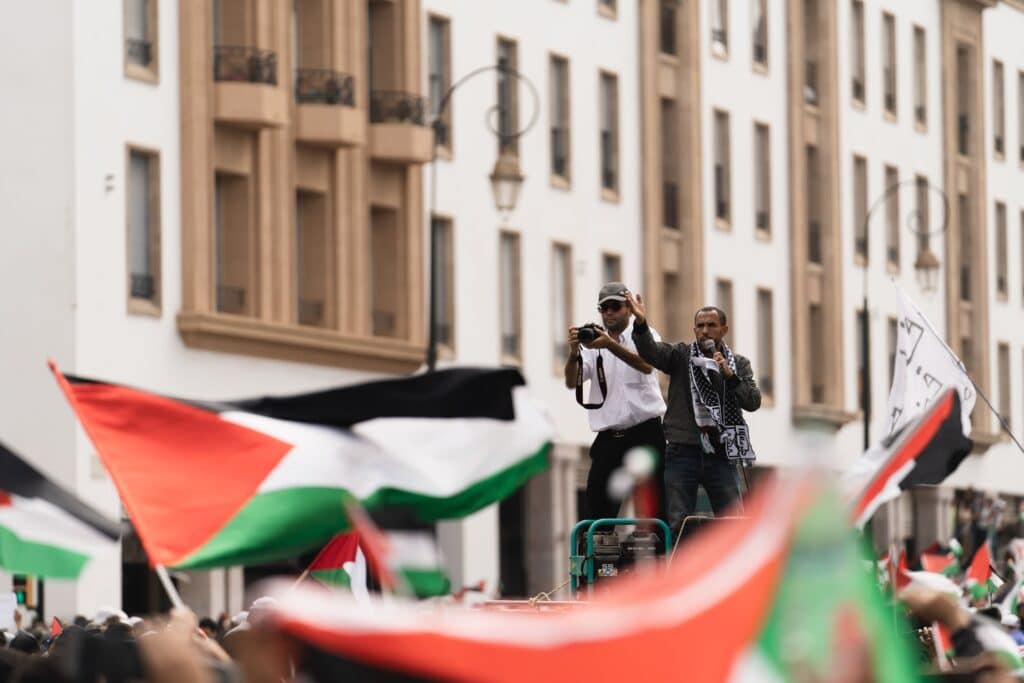Photo: People with Palestinian flags protest on the streets in Rabat, Morocco -. Pexels
As the war in Gaza unfolds and human suffering increases, there is still no unequivocal call from the international community for a ceasefire. The Middle East is observing this development with increasing astonishment. It is easy to get lost in the barrage of news and opinions about this conflict in the media, but a very valuable exercise for Western countries is to examine their own role through the eyes of political allies in the region. The FMS works with such allies and decided to interview a number of them. We found that holding up this mirror to ourselves is confronting, yet motivating to put in more effort for a peaceful solution.
In order to better understand the views on the conflict and the role of the West from countries in the MENA region, we spoke with Jad Fayyad, International Coordinator of the Progressive Youth Organization (Lebanon); Wael Mansi, Member of the Secretary Council and Chief Officer Media and Communication of the Jordanian Social Democratic Party (Jordan); and Hend Mgaieth, member of the political board of the Ettakatol Party (Tunisia).
Impact on the region
The war in Gaza is affecting people in the MENA region. "It affects all Arab countries," says Hend Mgaieth, from Tunisia. "We see that there is a genocide and in the process we also see the reluctance of the international community to do anything about it. The international community must intervene to end the conflict in a political way. Tunisians, alongside the Tunisian government are actively condemning assaults on civilians and striving to bring an end to the hostilities, including displacement and forced eviction. Palestinians are not alone, their cause is also ours."
A similar story can be heard from neighboring Lebanon. Because of Hezbollah's support for Hamas, southern Lebanon has become part of the conflict. Lebanese Jad Fayyad says: "The war in Gaza has caused the already existing conflict in southern Lebanon to further escalate. Lebanese citizens feel very threatened by the violence and fear that the conflict will spill over to the rest of the country. Wael Mansi from Jordan says: "The war and the violence of settlers in the West Bank have had a great impact on Jordanian society. Jordanians feel a strong connection with the Palestinians, we share the same religion and are both Arabs. There is very strong support in Jordanian society for the Palestinian cause and people speak out strongly against the aggression in Gaza."
"International and humanitarian standards are being ignored"
People in the region are watching the developments in the international community with astonishment. Jad: "The reaction of part of the international community to the war in Gaza ignores international and humanitarian standards, even though they instated these standards themselves. This allows Israel to wage a war that completely ignores basic war legislation and targets women, children and hospitals." Wael: "The position of some Western countries make people question the West's credibility on human rights and freedom. Jordanians find these countries' actions difficult to reconcile with the West’s supposed support for human rights.
To reach a solution, Hend argues that it's crucial for the international community to apply consistent standards worldwide. Otherwise, institutions like the EU risk losing credibility as impartial peace builders: "Reflecting on what is happening now, we can see that the violence is being ignored. Ensuring a secure peaceful future, and thus a peaceful resolution of the war in Gaza, must now be their priority. If this double standard will continue to be maintained, it is going to have major consequences for the future. It will generate more chaos and increase extremist movements’ acceptance.. Additionally, countries in the MENA region may reassess their alliances and become more inclined to cooperate with other actors like China and Russia. To counteract this trend, international institutions, such as the EU must take proactive measures to uphold international law and safeguard human rights.”
"Not all of Europe is keeping a low profile"
Still, there are some positive exceptions that Hend would like to point out: "It is important to highlight the efforts of some European countries. Portugal, Spain, among others, along with certain political parties have been working for a peaceful solution since the beginning. Not all of Europe is maintaining a low profile and the position of a government does not necessarily reflect the stance of its entire populace. There are indeed actors who are deeply involved and committed to upholding international law. They make their views heard, including at EU level. The efforts of these countries are crucial and provide significant support for the Palestinian people and Arab countries, particularly since Oct. 7 when sensitivity to supporting the Palestinian cause heightened."
"The West should take the lead in lasting peace"
Ultimately, a lasting peace must be worked for and the West should take the lead in this says Jad: "The West has the political and diplomatic authority to stop Israel's violence against civilians. After this, the international community will have to facilitate a political solution between the Israelis and the Palestinians that will ensure peace. This could take the form of a two-state solution, for example. Wael says: "An immediate cease-fire is necessary and humanitarian aid must be let into Gaza. In addition, the release of hostages must be negotiated and Israel must be prosecuted for its crimes in Gaza and the West Bank, so that a political process can then be initiated that will lead to security and peace."





